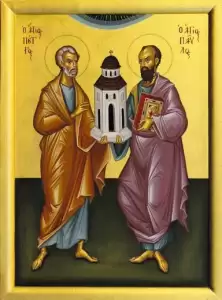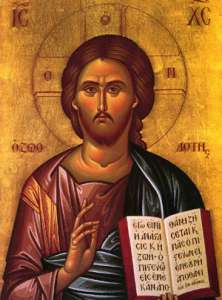Warning: Undefined array key "margin_above" in /home/stscahvallejo/public_html/wp-content/plugins/ultimate-social-media-icons/libs/controllers/sfsiocns_OnPosts.php on line 652
Warning: Undefined array key "margin_below" in /home/stscahvallejo/public_html/wp-content/plugins/ultimate-social-media-icons/libs/controllers/sfsiocns_OnPosts.php on line 653
Christians “…they love one another, and from widows they do not turn away their esteem; and they deliver the orphan from him who treats him harshly. And he, who has, gives to him who has not, without boasting. And when they see a stranger, they take him in to their homes and rejoice over him as a very brother; for they do not call them brethren after the flesh, but brethren after the spirit and in God.”
The Didache - circa 90 AD
For Sunday, October 30
 Epistle Reading
Epistle Reading
The reading is from St. Paul's Letter to the Galatians 1:11-19
Brethren, I would have you know that the gospel which was preached by me is not man's gospel. For I did not receive it from man, nor was I taught it, but it came through a revelation of Jesus Christ. For you have heard of my former life in Judaism, how I persecuted the church of God violently and tried to destroy it; and I advanced in Judaism beyond many of my own age among my people, so extremely zealous was I for the traditions of my fathers. But when he who had set me apart before I was born, and had called me through his grace, was pleased to reveal his Son to me, in order that I might preach him among the Gentiles, I did not confer with flesh and blood, nor did I go up to Jerusalem to those who were apostles before me, but I went away into Arabia; and again I returned to Damascus. Then after three years I went up to Jerusalem to visit Cephas, and remained with him fifteen days. But I saw none of the other apostles except James the Lord's brother.
Why does God allow persecution?
In this epistle reading, St. Paul recalls the time when he himself was a great persecutor of the church; hunting down and arresting the believers of Christ and having them imprisoned or put to death. But God chose him to become the greatest evangelist and apostle of Christianity. Here we have one of the most amazing conversions in Christian history. What happened to Paul was also what eventually happened to the Jews. Many who had once denied Christ, later became Christians themselves. The Roman Empire that sentenced Christ to death became a Christian empire. And the same conversions en masse continued as entire nations and peoples rejected their pagan myths and believed in Jesus Christ, including the Greeks, Armenians, Assyrians, Arabs, Spaniards, Georgians, Indians, Persians, Germanic tribes, Slavs, and so on.
This teaches us that God is always in control, even when the Church is being persecuted and everything seems hopeless. There is always a reason for which God allows his church to suffer persecution. God has a plan and His will must be done as history slowly trudges forward towards the end of time. In our own lives, we can make sense and accept the hardships and struggles that come to us also in this way. God is in control and there is a purpose and reason for our suffering that God alone knows. We have to trust in his will and accept both the good and bad that may happen to us. This is the essence of having faith in God instead of in ourselves.
Questions:
- Can you remember a time or event where something bad happened which afterward brought about something good?
 Gospel Reading
Gospel Reading
Luke 16:19-31
The Lord said, "There was a rich man, who was clothed in purple and fine linen and who feasted sumptuously every day. And at his gate lay a poor man named Lazaros, full of sores, who desired to be fed with what fell from the rich man's table; moreover the dogs came and licked his sores. The poor man died and was carried by the angels to Abraham's bosom. The rich man also died and was buried; and in Hades, being in torment, he lifted up his eyes, and saw Abraham far off and Lazaros in his bosom. And he called out, 'Father Abraham, have mercy upon me, and send Lazaros to dip the end of his finger in water and cool my tongue; for I am in anguish in this flame.' But Abraham said, 'Son, remember that you in your lifetime received your good things, and Lazaros in like manner evil things; but now he is comforted here, and you are in anguish. And besides all this, between us and you a great chasm has been fixed, in order that those who would pass from here to you may not be able, and none may cross from there to us.' And he said, 'Then I beg you, father, to send him to my father's house, for I have five brothers, so that he may warn them, lest they also come into this place of torment.' But Abraham said, 'They have Moses, and the prophets; let them hear them.' And he said, 'No, father Abraham; but if some one goes to them from the dead, they will repent.' He said to them, 'If they do not hear Moses and the prophets, neither will they be convinced if some one should rise from the dead.'"
Being selfish vs. being merciful
Because the Lord first taught, above how we are to be good stewards of wealth, now He appropriately adds this parable which teaches the same thing through the example of the rich man. This is a parable and not, as some have foolishly imagined, something which actually occurred. For good things have not yet been allotted to the righteous, nor punishments to the sinners. The Lord, then, fashioned this story to teach those who show no mercy and give no alms what punishments await them, and to teach the suffering what good things they will enjoy on account of the sufferings they patiently endure in this life. The Lord gave no name to the rich man in this parable, because such a man is not worthy to be remembered by God by name. As the Lord says, through the prophet, nor will I make remembrance of their names through My lips. [Ps. 15:3] But the Lord mentions the poor man by name, for the names of the righteous are inscribed in the Book of Life.
There is a story, according to the tradition of the Hebrews, of a certain Lazarus who lived at that time in Jerusalem, whose lot was one of extreme poverty and sickness. Because he was so well known in the city, the Lord uses his name in the parable. The rich man was awash in wealth, so much so that he clothed himself in purple and costly linen. Not only this, but he also luxuriated in every other kind of luxury. For it says that he fared sumptuously, not now and then, but everyday, and not in moderation, but sumptuously, meaning, extravagantly and at great cost.
But Lazarus was destitute and grievously diseased, for it says that he was full of sores. It is one thing to be ill; it is another thing to be covered with open sores. But the evil which he suffered goes even further: lying at the gate of the rich man, he had the added torment of seeing others feasting to excess while he himself starved. He desired to be fed, not with their costly foods, but with the crumbs of these foods, the same crumbs which the dogs ate. He was also destitute of any help, for the dogs licked his sores, and he had no one to drive them away. Lazarus suffered such terrible things. Did he then blaspheme? Did he revile the luxury of the rich man? Did he condemn his callousness? Did he accuse the Divine Providence? He did none of these things, even in thought; rather, he bravely and wisely endured all.
How do we know this? From the fact that the angels took him when he died. If he had been a grumbler and blasphemer, he would not have been deemed worthy of such an honor—to be escorted by angels. The rich man also died, and was buried. In truth, while he still lived his soul had been buried alive, entombed within his flesh. Therefore, when he died, his soul was not led away by the angels but was instead borne downwards into hades. He who has never had a single lofty or heavenly thought deserves the lowest place. Thus by saying that he was buried, the Lord implies that the rich mans soul received its portion in the lowest and darkest place.
St. Theophylact of Ochrid
Questions:
- Why did the Rich Man receive punishment in Hell?
- Why did Lazarus receive comfort in Heaven?
- What can we do to make sure we don't end up like the Rich Man, even if we aren't rich?
 St. Joseph I Galesiotes, Patriarch of Constantinople
St. Joseph I Galesiotes, Patriarch of Constantinople
Joseph had been married for eight years when his wife died. He became a monk and a Reader for about thirty-two years and became abbot of the Lazaros Monastery on Mt. Galesios near Ephesus. Joseph later became the confessor to Emperor Michael VIII Palaiologos. Michael sent Joseph to Patriarch Arsenios to lift Michael's ex-communication for having blinded the young John IV Laskaris. When Arsenios refused, Michael deposed him and, in his place, named Joseph to the Patriarchate, and Joseph soon pardoned Michael. However, Joseph fell out with Michael over his projected union of the Orthodox Church with the Roman Catholic Church in 1272. When a delegation prepared to travel to the Synod of Lyon to effect the Union, Joseph retired to a monastery. When the emperor died, his son recalled Joseph to the Patriarchate, but he resigned shortly before his death in 1283. Because of his stance against the union, St. Joseph was declared a confessor by his successor Gregory II.
Thank you for participating in SOFIA! If you've subscribed to our newsletter, look for an email notification next week when a new lesson page is posted. See you Sunday!

 Weekly catechism and spiritual devotion for the Orthodox home
Weekly catechism and spiritual devotion for the Orthodox home